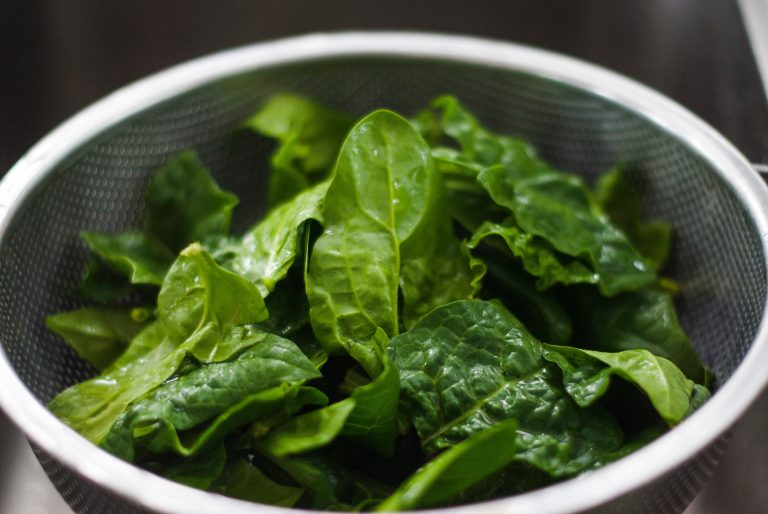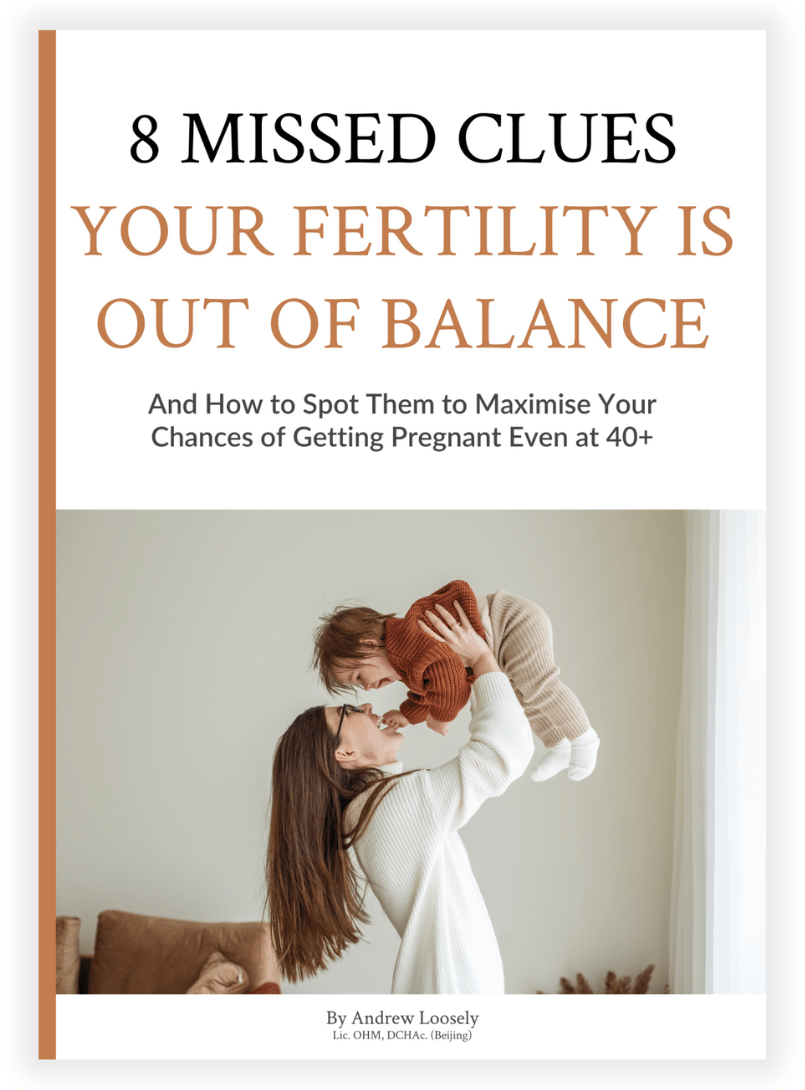The problem with Spinach

Rich in Iron and therefore great for your blood, spinach seems like a fantastic fertility food.
It’s also packed with Magnesium, Beta-Carotene (precursor to vitamin A), Vitamin C, Folate (natural folic acid), loads of chlorophyll (helps make blood cells) and lots more!
BUT – it’s not all as it appears on the surface.
Spinach is packed full of iron at 2.6mg per 100g, compared to 2.5mg per 100g of beef.
However, it’s important to note that there are different types of iron.
Beef contains haem iron whereas spinach contains non-haem iron. Non-haem iron is harder for your body to absorb and use.
This reduced absorption of iron is further intensified by the polyphenolic compounds that also exist in spinach.
When we compare the two, we find that spinach provides us with 1.7% absorption rate, which provides a meagre 0.044mg of iron.
Compare this to the beef where we have a 20% absorption rate, and this delivers 0.5mg of iron absorbed.
So, although spinach starts out as having slightly more iron, beef ends up the more nutritious way to get your iron out of the two.
And as if all that wasn’t enough – spinach also puts certain people at risk of developing various types of stones, such as kidney or bladder stones and this may further complicate your fertility journey if you’re prone to stone development.
The high content of oxalates in spinach causes it to react with calcium, reducing your possibility of using the calcium, and instead forms it into stones.
It’s noted that the following 3 actions can reduce this effect:
- Always eat spinach cooked
- Eat it 2 – 3 times per week max
- Use some lemon juice squeezed over the spinach to reduce the oxalates
Key nutrients of Spinach are:
Beta-Carotene (precursor to Vitamin A): This helps you create Vitamin Aonce absorbed. Vitamin A is necessary for the growth and repair of many body cells including bones, teeth, collagen, and cartilage. It’s also involved in cell differentiation where cells become specific types of cells such as a liver cell or a blood cell. This is vital for the development of your healthy baby, and so Vitamin A should be sufficient in your diet in a food form. Supplementation does not offer balanced forms of Vitamin A.
Vitamin B1: Thiamine is involved in the production of energy through the breakdown of sugars and carbohydrates. This is important for cellular health, which may also influence the health and energy of sperm and egg cells. Vitamin B1 helps turn starch and sugar into usable energy that your body needs and plays an important role in nerve transmission. It’s also important for energy support during pregnancy. Muscular and nerve health are also affected by Thiamin.
Vitamin B9: Folate is essential for human growth and development and it encourages normal nerve and brain function. It’s involved in the creation of DNA as well as building of proteins, and many other important functions including the healthy development of your baby’s spinal cord.
Folate has long been known for its protection against spina bifida, but many people don’t realise that it’s also important for their day-to-day health.
During pregnancy folate also supports the growth of the placenta and helps to prevent several types of birth defects, especially those of the brain and spine. Folate is an important nutrient for general and fertility health.
Vitamin C: Vitamin C helps to repair and regenerate tissues, help with the absorption of iron, prevent scurvy, and decrease total and LDL (“bad”) cholesterol and triglycerides.
Research shows that vitamin C protects against free radicals due to its antioxidant nature. It also helps neutralize the effects of nitrites (a group of commonly used preservatives), which many people come into contact with daily.
For fertility health vitamin C is important in the process of absorption and also in its ability to support the luteal phase of the menstrual cycle.
Supplement forms of vitamin C are usually inferior compared to natural sources and my advice is to obtain this nutrient from your diet daily through fresh vegetables and fruit.
Vitamin K: Vitamin K is an essential nutrient necessary for responding to injuries as it regulates normal blood clotting. By assisting the transport of calcium throughout the body Vitamin K may also be helpful for bone health. It may reduce bone loss, and decrease risk of bone fractures. It also may help to prevent calcification of arteries and other soft tissue.
Phosphorus: Is an element that plays an important role in how the body uses carbohydrates and fats. It is also needed for the body to make protein for the growth, maintenance, and repair of cells and tissues. It is essential in our diet and particularly in children when growth and development occurs.
Calcium: Calcium is needed to build and maintain strong bones, support heart health, and for optimal function of the muscles and nerves. It is also required alongside Vitamin D to aid in its use throughout the body.
Iron: Is a mineral that the body uses to carry oxygen in the blood and plays a key role in strengthening the immune system and helps regulate body temperature.
Magnesium: Supports a healthy immune system as well as keeps bones strong. It is also great for stress and combined with vitamin B6 can help induce sleep and alleviate symptoms of bloating and weight gain associated with PMS.
Potassium: Is an electrolyte which counteracts the effects of sodium, helping to maintain consistent blood pressure levels – another important element for pregnancy.
To read more about how these nutrients affect your fertility, please click on the individual vitamin and mineral links.
CHINESE FERTILITY MEDICINE USE IT TO:
Treat Internal Heat
Treat Yin Deficiency
Treat Blood Deficiency
INTERNAL HEAT
Internal Heat is a pattern of imbalance in Chinese Fertility Medicine that presents as one or more of the following symptoms: a general or localised feeling of heat in your body, a fever, red skin eruptions and various types of pain and sores, ongoing increased thirst, constipation, and a selection of issues that western medicine would call inflammation. However, not all inflammation is caused by heat and this needs proper assessment.
Internal Heat also presents with signs of over-activity, mood changes, discolouration of body fluids (usually darker such as yellow urine), and symptoms of dryness and heat.
Too much Internal Heat typically affects the fluid and blood balance of the body, and this can negatively impact egg and sperm quality to varying degrees.
Click here to read more about Heat
YIN DEFICIENCY
Yin Deficiency is a pattern of imbalance in Chinese Medicine that describes depletion of body fluids.
This is not dehydration, but a deep and longer-term type of fluid deficiency or dryness of the body.
Reduced fluid levels in the body interfere with temperature regulation, blood and fluid circulation, blood control (can lead to bleeding), and delivery of nutrients and vital substances around your body – including to egg and sperm cells.
Click here to read more about Yin Deficiency
BLOOD DEFICIENCY:
Blood deficiency is a Chinese Medicine term used to describe an imbalance in the ‘quality’ of the blood.
The blood is responsible for circulating nutrients throughout the body to all your cells, including egg and sperm cells.
When it is deficient the blood can’t properly nourish the body and certain aspects of health get out of balance.
This can impact egg and sperm health as the deficient blood is unable to transport necessary nutrients to the eggs and sperm – causing a depletion in their quality, quantity, and activity.
If the Blood deficiency reaches a deeper level of imbalance you will see physiological changes in the blood, such as reduced iron, haemoglobin, ferritin, B-vitamins and other nutrients. You may also see changes in the volume and quantity of the blood, along with its clotting ability or nature.
Blood deficiency often presents itself with some of the following symptoms: dry, flaky, or rough skin, dizziness, poor circulation with cold hands and feet, tiredness, scanty menstruation, low concentration of sperm, high level of poor sperm morphology, hyper-tonicity of body tissue and more.
Click here to read more about Blood Deficiency
Season available: Spinach is available all year round but is in season during the late winter, spring and summer.
How it’s typically cooked: Always wash spinach before consumption. Spinach is very versatile and can be eaten alone or with other foods. It can be added to stir-fry’s, casseroles, stews, curries, pureed or blended into sauces.
Cautions: Spinach contains a high amount of oxalate. If you have a history of kidney stones, please avoid or eat rarely.
Need more help?

Free Guide
8 MISSED CLUES YOUR FERTILITY IS OUT OF BALANCE – even if you’re over 40
Discover What’s Stopping You Having Your Baby
8 MISSED CLUES YOUR FERTILITY IS OUT OF BALANCE – even if you’re over 40
If you’re 40 or over and pregnancy isn’t happening for you naturally, or with IVF, then this guide will help you discover why being 40+ isn’t a barrier to having a baby – as long as you identify the root cause of your fertility issues and then bring your body back into balance.